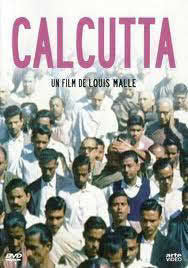Calcutta

Director: Louis Malle
Year: 1969
Rating: 6.0
Now Kolkata
A Louis Malle documentary.
Malle was editing his documentary titled
Phantom India that is six hours long and he realized he had enough film for
a separate film on the city of Calcutta. 8 million people in 1969. Hundreds
of religious sects and dialects.
I wish I had been able to watch this with
my parents. My father was stationed there in the late 1950s in the American
Consulate and we were with him. Some people got Paris. We got Calcutta. I
was very young at the time and have only flashes of memories of the city.
We lived in a large compound with iron gates that were much higher than I
could climb and guards at the entrance. I expect my parents were very protective
of me and I was no Kim wandering the city streets alone. I did speak Urdu
though as my first language and when we returned back to the States, I had
a thick accent. The teacher called up my mother to tell her that I had a
speech impediment! Sadly, I never kept it up. My mother volunteered to work
with Mother Theresa and had nothing nice to say about her. My brother and
I would get rickshaws in the morning - the old-fashioned kind in which a
man in bare feet pulled it. Faster, faster we used to yell at them. Yes,
we were brats.
Watching this 90-minute documentary brought
back a bit of it. I imagine my parents would be angry with this. They loved
it there. A large apartment and servants - the tall thin dignified Usman
with his turban took care of me - and parties most nights with other people
of high status. Malle not surprisingly doesn't focus on that part of Calcutta
beyond a few minutes at the golf course and races. Beyond what he shows,
it is the city of many great Urdu poets, Satyajit Ray, Kishore Kumar and
the Mukherjee family. It is famous for its literature and Noble Prize winners.
Of its food, Bengali culture and art.
Malle isn't interested in any of that. He
wants spectacle, moving images of political protests (Calcutta had a strong
Communist Party at the time), religious parades and rites, weddings, masses
of people walking to work, people bathing in the Hooghly River but especially
he is interested in the grotesque, the tragic, the poverty, the sickness.
It feels very intrusive to me - no privacy from the camera - faces deformed,
hungry, broken. He even films a woman being prepared for cremation in the
open street as they pile wood on top of her and set it on fire. No privacy
even in death.
I found it both fascinating and horrifying
at the same time. The amount of people is overwhelming as is the variety
of dress, ethnic make-up, faces, employment. I don't know if Malle's purpose
was to shame the city to take better care of its people. His journey into
a slum will make you want to cry. And they have it better than their neighbors
- the thousands of lepers in different stages of advancement. People have
to share their space with the sacred cows that are everywhere or herds of
sheep and goats being walked through the busy streets. I felt immersed in
in at times and wanted to leave. Hot, dirty, squalid. As I sit in my nicely
airconditioned apartment with a refrigerator full of food, I felt a world
apart. Thankfully. It all depends on where you were born. I suppose this
makes for a strong documentary - shocking to Western audiences - but it also
seems unfair - a Westerner making choices to show the worst - colonialism
of a different nature.

